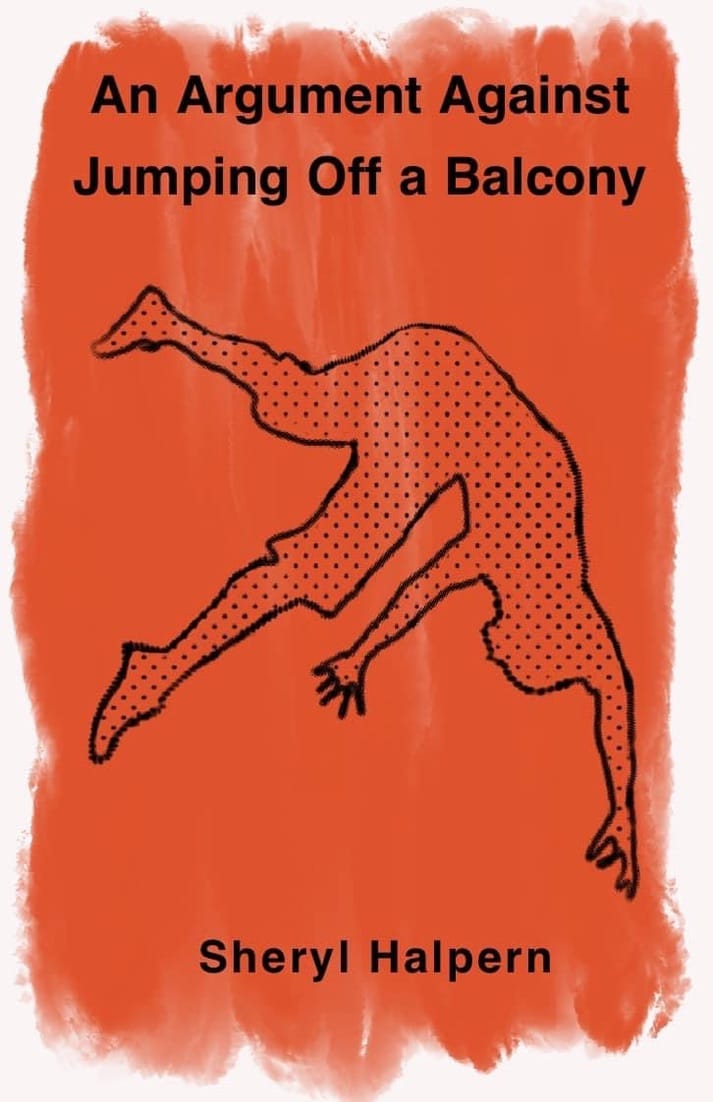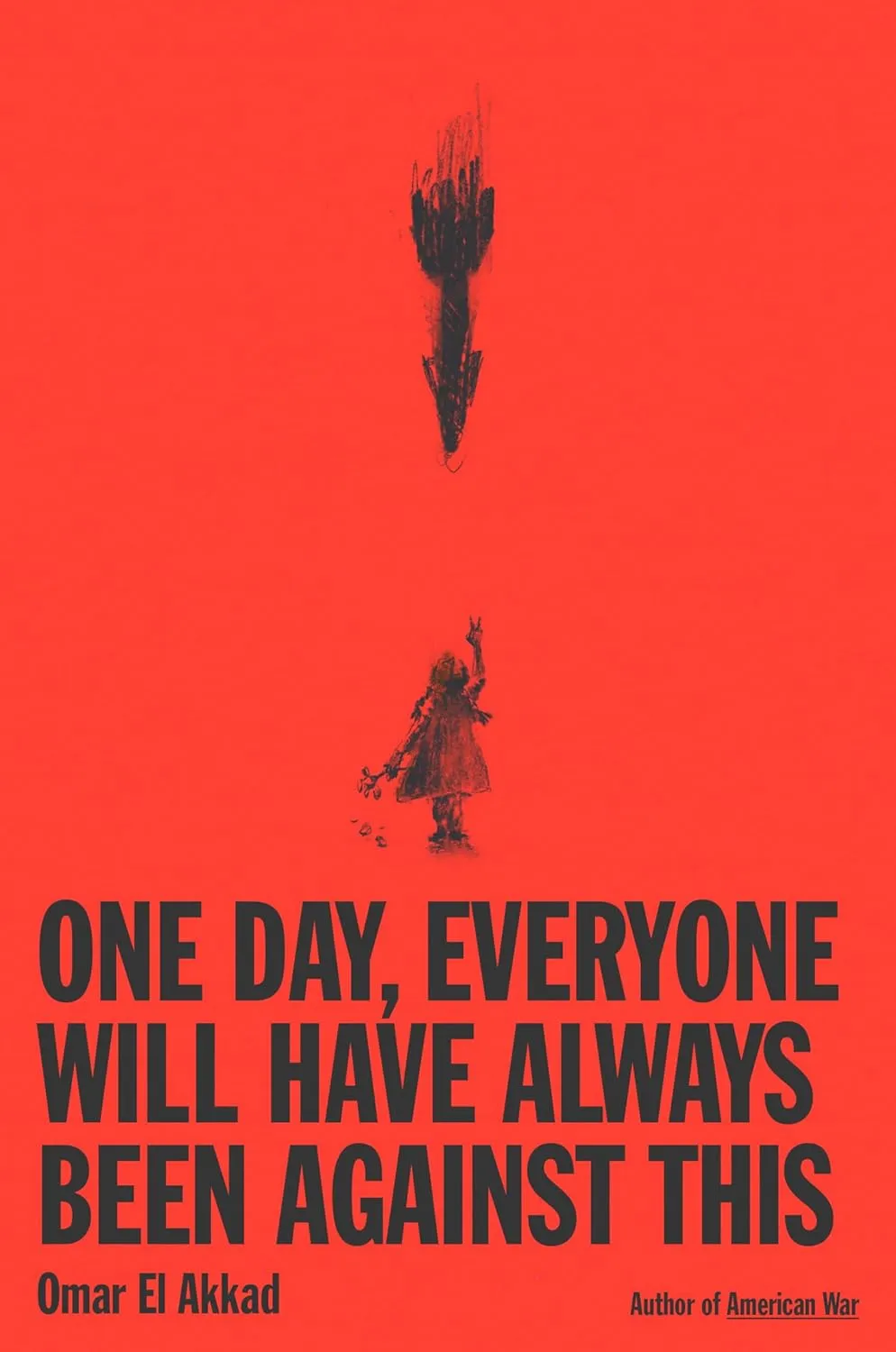Sheryl Halpern, An Argument Against Jumping Off a Balcony
Halpern's poetry is addicting to read, evocatively sincere, knowing and novel.

Who hasn’t had an intrusive thought?
Sheryl Halpern’s 2024 chapbook with James Hawes’ Turret House Press in Montreal features the outline of a body on a stark orange watercolour cover, itself filled in with a reprographic dot pattern that simultaneously looks like a chalk outline and a body in motion, with arms outstretched towards the bottom of the paper, falling headfirst, legs akimbo—cover design James Hawes.
As far as poetry book titles go, this one slaps in a way which relies on the humorous rhetoric and syntax involved. Not to kill a joke by explaining it, of course, but “an argument against jumping off a balcony” has the clear implication that, for all intents and purposes, everything else is an argument for. Relatable.
![[Image alt-text: A man smiling and laughing pretending like he’s gonna jump from a balcony, drink bleach and set himself on fire]](https://bibelotages.com/content/images/2025/04/kbXRDrabvxQnlNdE.gif)
I flip to the back of the book for any hints since this is my first time reading Sheryl Halpern. She is the author of the story collection Surviving Love (2013) and taught literature at Dawson College for 25 years. She has also published poetry, articles and reviews in Quarry, The New Quarterly, The Montreal Gazette, Books in Canada, and Canadian Literature.
It’s pretty exciting reading yet another new author for me whose work has been made available through James Hawes’ micropress endeavour. Combined, these works bring together a particular Zeitgeist and perspective of Anglo Montreal that would likely go unnoticed without his efforts to consolidate a particular cohort of writers from across the city. It becomes clearer the more and more I review these chaps.
I open it. The first poem in the book draws me in:
No Safe Places
there are no safe places—
in my old stone convent college,
Gothic gunmen
stalk blondes, spatter blood
over the snack machines.
at my coffee shop, I’m asked
for something and my purse
evaporates,
with my life inside.
there are no strange places—
in dark rain,
when I fall, arms reach to catch me.
friends bend down
to make sure I can walk.
what burns may warm me.
what cuts might heal me too.
all places now
the many faces of the unknown God,
the flaming saving core.
What burns may warm me. The topics of school shootings, arson and random acts of violence are no strangers to the average Montrealer.
This poem moves in a certain direction that I wouldn’t say glorifies it, but romanticizes the darkness that characterizes this metropolitan existence we share.
That’s sort of the beauty of poetry, in a nutshell.
Don’t let me get too grandiose too quick, though.
The next poem is titled “Jonah, or My Whale,” and I don’t know what it is, but for some reason Montreal and whales have a certain connection I’ve never been quite able to put my finger on. But this is more a biblical reference than anything relating to local lore:
[...]
I could be near shore
or on far sea mountains
who knows but whale
who needs no prophet
who heeds no call
from me, within
its mucky ribbed walls
of fleshy, warty well
black black black
bleak always
somewhere outside,
the bible goes on
and I’m not even cited,
[...]
Before skipping to the fifth poem in the chap, a special mention for the subject of the third poem, “Kintsugi is the Japanese for This,” because I used the word in one of my reviews the other day and simply love the meaning of it (to mend with gold).
The titular poem builds quickly to get to its third stanza:
[...]
I’ll join you on the ledge.
one day, one day more
will break my tension
sure as a blade breaks a strung catgut
one more day should do it
the shivering over then
all quiet and musty
as grandmother’s room
with faded rose carpet
all sleep
I leap
[...]
This is the crux of the whole collection. I left off the tercet which concludes it, not because I didn’t give a spoiler alert, but because I genuinely think the work is worth getting and not spoiling.
There’s a peculiar phrase in French I discovered once at the BnF, reading about Eratosthenes, who (perhaps not so famously) killed himself. The euphemism employed by the historian was that the chief librarian of the Library of Alexandria chose to mourir en philosophe, go the way of the philosopher, which is certainly a choice of words.
Sheryl Halpern’s poem very much seems to address that particularly taboo discourse, but in a brief way that sees the darkness in her readers and says everything’s going to be okay.
But not every poem is so glum. The one above, in its entirety, isn’t either. Just real.
But I love this poem that appears a few pages after:
Event Horizon
because we’re drawn near to the event horizon
(long last finish line)
where reality thins to a point
and then blips
because we can see
the strange burning sunset
high hills that are really
tall waves approaching
I have a checklist
that I’ll keep ticking
-stop diet (reach impossible
slenderness
soon)
-buy sundaes with caramel sauce and whole peanuts
-call girlfriends and ramble for hours about nothing
-hum favourite songs that keep going and going
-arrange my collections, my shells, tins, and china
-read through our library, fiction, non-fiction
down to the tomes on the shaky night tables
-let my tinnitus hide all the echoing booms
-keep my back to the windows in all of our rooms
[...]
And I think that’s hilarious.
But more so than that, I have to interrupt myself before printing the whole poem to note that, almost in spite of her PhD in English literature and quarter century of teaching about writers, she bears none of the pretentiousness of a professor. Sure, there are times her verse can ring a little sartorial, but in general, I find her leaning into rhyme and zoology to grant her poems an arresting and Rimbaldian quality.
The poem continues:
[...]
wade into denial
(swim de warm, soupy Nile)
long enough to name all
the great grey crocodiles
remember the goal is
we don’t meet the goal
(if we cannot see it
there is no black hole)
make jokes and bad puns, wield wordplay, not brevity
maybe hope, renamed levity
will halt, will stall
our fall
down the gravity well
into night
we’ll float bright-hearted
all shadows
gone white
and maybe
there will be
a last flash
of light
I read through the rest of the collection silently at my desk, 27 poems in all (“Driving My Daughter” is probably my favourite of the bunch). Without inviting comparison, her poems remind me of informal observational poems such as Michel Garneau’s Une pelletée de nuages (1999) or even the much more iconoclastic poems of Jacques Prévert’s Paroles (1946) or Wisława Szymborska’s Wołanie do Yeti (1957).
Halpern's poetry is addicting to read, evocatively sincere, knowing and novel.
If you have the time and money to spare, definitely get yourself a copy of anything Sheryl Halpern is writing. You won’t regret it.
I will regret if I don’t add one last word: please write so much more.
Bibelotages Newsletter
Join the newsletter to receive the latest updates in your inbox.



